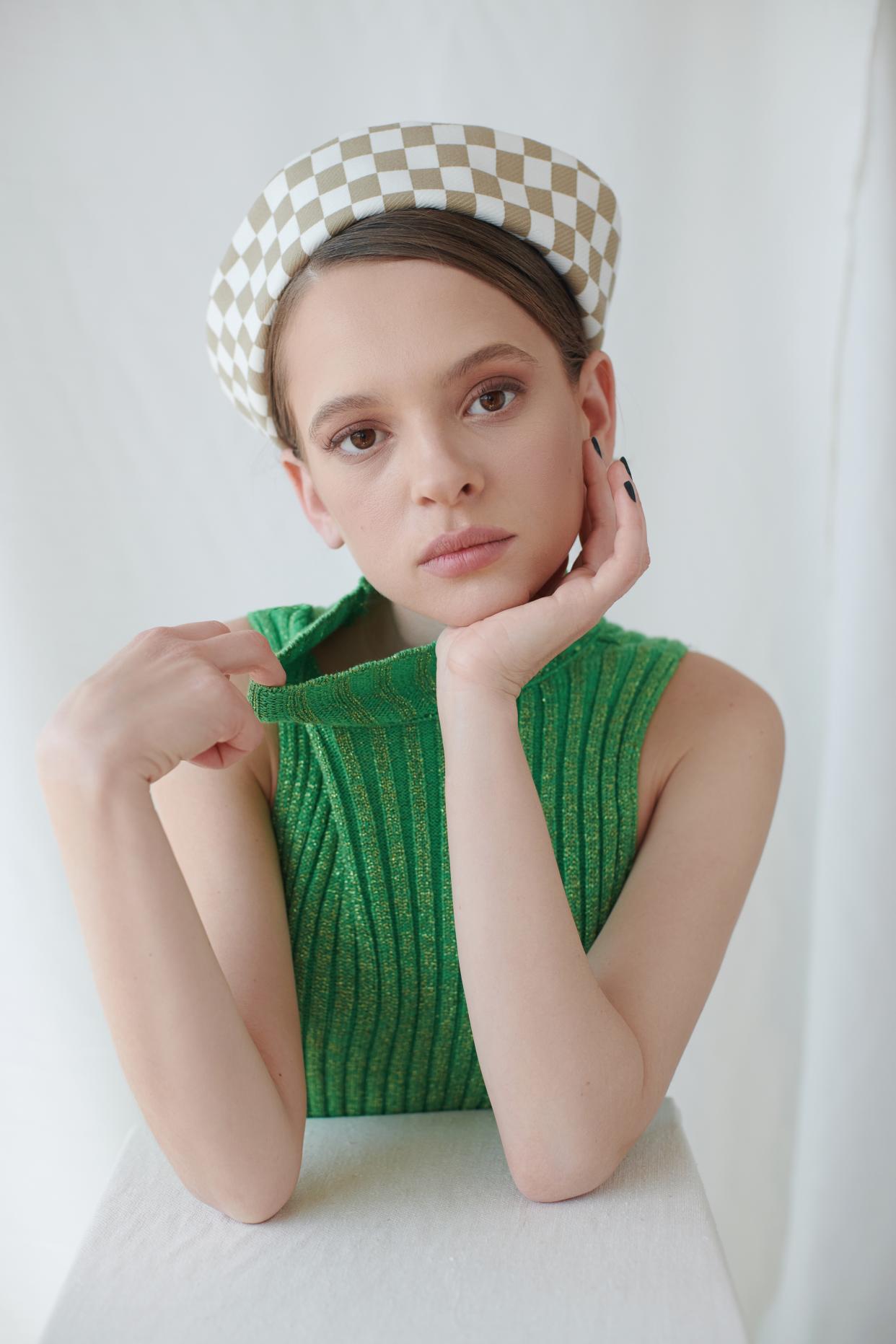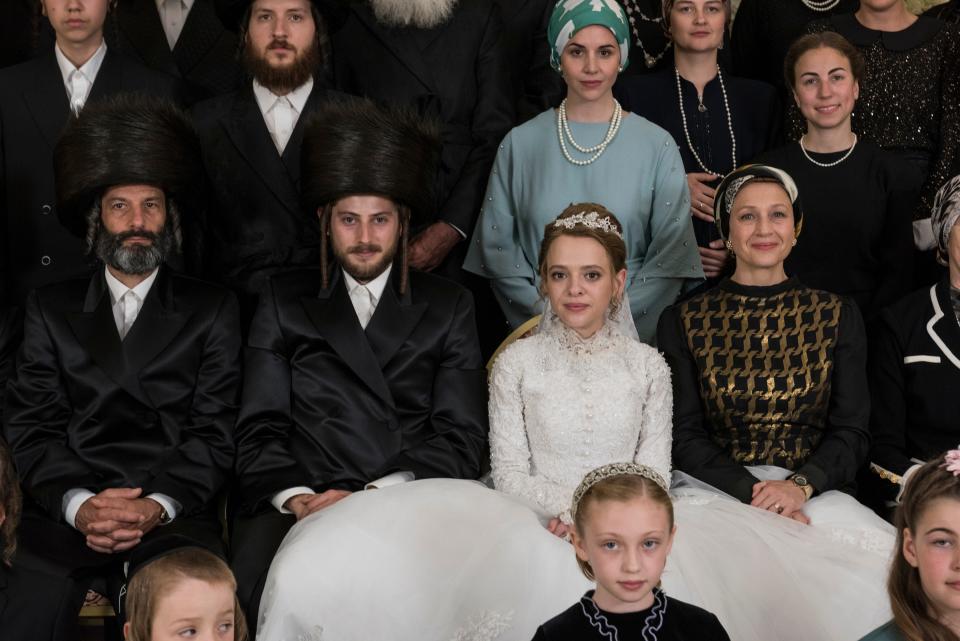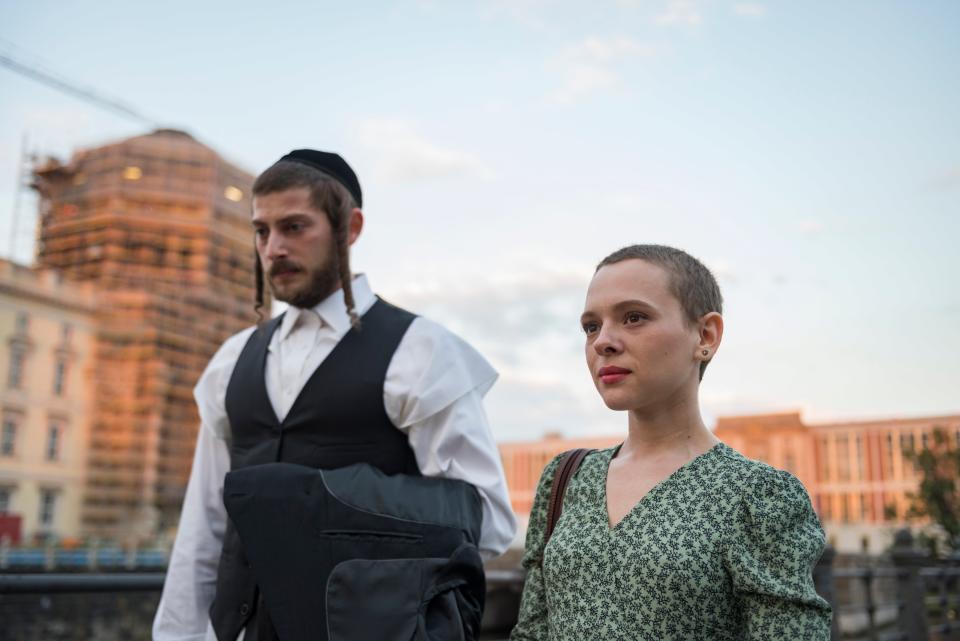Beanie Feldstein Interviews Shira Haas About Her Netflix Drama Unorthodox

The Netflix series Unorthodox, which is based on Deborah Feldman’s memoir Unorthodox: The Scandalous Rejection of My Hasidic Roots and stars Israeli actress Shira Haas, has become wildly popular. The story goes like this: Haas’s character, Esty Shapiro, grows up in Brooklyn in the ultra-Orthodox Satmar community, a stringent faction of the Jewish faith. Her upbringing is relegated to the closed-off, strict, tradition-heavy enclave, and Esty is quiet and reserved, but curious, and takes up piano lessons—a no-no—with a non-Jewish teacher.
Still in her late teens, Esty marries Yanky (played by fellow Israeli actor Amit Rahav). Upon their first and only meeting before they get married, with their families in the other room, Esty tells Yanky that she is “not like other girls.” The relationship sours: They are unable to consummate the marriage and Esty feels Atlas-like pressure from Yanky’s family. Feeling more and more suffocated, Esty plans her escape from Williamsburg, from Yanky, and her life.
The show’s popularity is not necessarily based on examining the extremes of another culture, but rather tells a universal story about someone discovering themselves, a tale about coming of age. At one point or another in our lives, we have all been Esty, trying to find our footing and figure ourselves out. Esty chooses to head to Berlin, where her mother had also fled, and befriends a group of young musicians.
Unorthodox has gained several fans, including Booksmart’s Beanie Feldstein (who has her own coming-of-age story on the way—How to Build a Girl, which will be released on May 8 by IFC Films). Feldstein may be an actress, but she is also a star interviewer; over the phone, the two discussed Haas’s critically acclaimed portrayal in Unorthodox. —Liana Satenstein

shira-haas-unorthodox-wedding
Photo: Courtesy of Anika Molnar/NetflixThe world is falling in love with you right now, and I wanted to talk to you about Netflix and the role it is playing in your life. You are able to be able to be seen by the biggest viewpoint. Unorthodox is everywhere now, and people are loving it. So what does it feel like to be a part of the new Netflix generation of shows?
It is really amazing and it was a surprise. I can really feel the love. I always believed in the show and the role that I did, but, as you know, you can never tell what is going to happen with the thing that you are doing. I can’t take it for granted that so many people all around the world, no matter what their religion is, not necessarily Jewish, or secular, connected to the show and to Esty. The fact that it is has touched so many people and that it is universal is such an amazing thing. It is everything you could ask for as an artist. The highest form of connecting is art. If you just heard about the show or a story about someone like Esty on the news, maybe some people would say, “Oh, those people,” but once you see the show you’re like, “She is like me”—not only Esty but also different people as well.
I loved the show’s commitment to detail and authenticity and honoring the traditions and the rituals and the language of the Satmar people. I love the success of Parasite and what the director, Bong Joon Ho, said: That if you can look past the subtitles, you can learn so much about so many different people. Your show is a beautiful example of that—not shying away from the specifics and not watering them down actually makes it so much more universal because there is an instant connection to feeling that is so powerful in the show.
It is a new thing for many people. Maybe a few years ago maybe the show would have been done, but not in Yiddish, for example. There are now so many different TV series on Netflix in so many different languages and cultures. Over the past few years, people have become way more open to it and people want to see someone who is different from them and realize, “Yes, it is a specific story, but I can relate to it,” or “He is different from me, but he is a human being and I understand.” I think young people—at least I do—want to see that and not necessarily themselves all the time.

shira-haas-unorthodox-1
It also breeds compassion and celebrates compassion, and it is a very important form of storytelling. Speaking of Yiddish, I wanted to hear your journey of learning it, because I could not imagine what an insanely immense task that must have felt like. Did you learn directly with Eli Rosen [a consultant on Unorthodox]?
You know how you learn so much sometimes and you feel like your brain is melting? We spent a lot of hours together, Eli and I. I learned it from almost nothing. So it was really different for me. It was hours and hours every week almost every day. I recorded him. I listened to him and I also wrote in it. It required a lot of work, but it was really important to me. I really love learning new languages and new cultures; I’ve also learned Russian for a role. Yiddish is a hard one, but in a good way.
What was your first costume fitting? Was it emotional meeting with your costume designer? What did it feel like inhabiting Esty’s hair, which is such a visible part of that visual journey and an emotional one? It is adding and removing armor almost, that you were shedding and gaining throughout the show. It was so exhilarating to see the different looks, but also the way that you took them on—it was different. It was so clearly collaborative.
It was really important to find young Esty, like an innocent Esty, then married Esty. There is married Esty, where she is feeling like that is choking, and everything is a bit big on her and darker suddenly. Then obviously she goes to Berlin. It starts with the hair and then slowly [progresses] with the outfit. In real life, it might take much more time to be able to do that, but it was really more about the emotional journey of Esty through the costume.
With the hair, it was an emotional journey. I remember every time I looked in the mirror, I was different. I had the shaved head, I had the buzz cut, I had my “young” wig, my “married” wig, and the hat when I was married. Every time I looked in the mirror, it was a surprise to me. Esty has so many different phases where she is trying to figure herself out.
When did you shave your head? Did you know the schedule?
I remember I was drinking wine with the director and she said, “Shira, I need to tell you something.” Then she told me that it [shaving my head] was the first shooting day. I remember that I was shocked for a second. It brought the whole production together to do it and it really bonded everyone to take part in it. I’m really positive that it helped me to get into Esty and to start with that and to be committed to the role. It was one heck of a welcome. Maybe I didn’t know everyone’s names yet, but they helped me shave my head. I was looking forward to it, but I was having butterflies. I always say it was kind of like Esty—she has mixed emotions, she wants to get married and she is happy, but she is also scared.
I have a very actor-y question. If anyone watched your brilliant performance, they can see that you can say everything without saying anything. I read that you love to take away lines, and you don’t feel you need words. I’m someone who’d rather rattle on all day than say anything without words. I think it is so clear in your style of acting that you can communicate so much with such little verbiage. Did you always know that about yourself, or is it specific to Esty? Or is it throughout all your work?
In general, it depends on the character. I have had characters before this who wouldn’t shut up! But in dramas and coming-of-age stories, it is kind of like real life—we don’t always say what we think and want, even if we have something to say. We don’t deliver everything we feel in real life. And in cinema you don’t have to do it, and it is more interesting, in my opinion, and realistic. The first movie I was when I was around 16 or 17. It was a hard-core drama, artistic movie. I had never done anything before on camera. I had a really good director who really worked with me not to hide my face and my movements. She told me to look at something and to think, and I think it influenced me.
Also, you have such a chemistry with [the actor] Amit [Rahav]. I read that you two are like “mishpocheh [family].” Can you talk to me about that relationship? Those scenes between the two of you are so intimate and so vulnerable, even though you are playing two people who cannot connect. I imagine that you really trusted one another as actors and were able to be vulnerable. Talk about the chemistry between you two, because you are portraying a lack of chemistry, but there is so clearly this connection.
Amit and I have known each other for 10 years already. It is a fun fact. We had mutual friends and we knew each other for 10 years and we joked that we should work together one day. I have had roles that I had intimate scenes and crucial scenes with people I didn’t know, but you do need to build something with someone to trust them, not only to feel comfortable with, but so you can see that from the camera. There are great editors; you can do it without that. But if you have a good connection with someone—I’m talking about Booksmart!—you can really see it. I really trust him.
The film is so much about belonging—where you belong and finding it for yourself and creating it yourself. So who, what, and where makes you feel like you most belong?
That is a beautiful question. I feel like acting comes to mind. With acting, I feel confident but also curious, and that I want to learn more, which is a good combination. It is something that I feel like belongs there. I remember my first movie—I was really young, and I said to myself it was a new thing but it was like Narnia, the door was open. I really felt like I belonged somewhere and I found something.
Originally Appeared on Vogue

